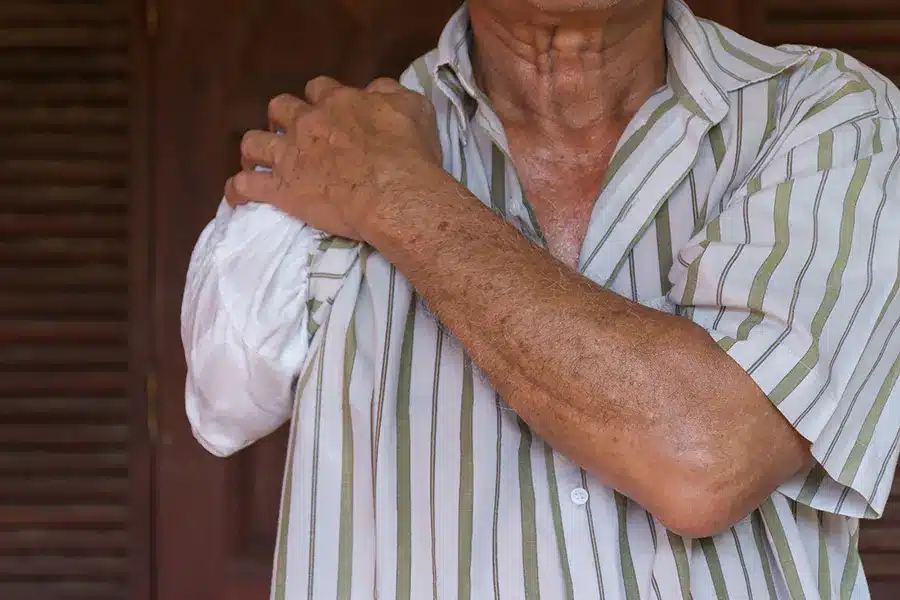Learn if you qualify for workers’ compensation after a finger or hand injury in Charlotte and how
to maximize your benefits
No matter what industry you work in, your hands are likely an essential tool you use every day, often without much thought—until they get injured. From construction and manufacturing to health care and service industries, even minor hand or finger injuries can significantly impact your ability to perform your job.
The good news? North Carolina’s workers’ compensation system offers financial assistance and medical coverage for eligible workers who suffer hand or finger injuries on the job.
This article will explore the various ways hand and finger injuries can occur in the workplace, the benefits available through workers’ compensation, and the steps you should take to maximize your benefits if you experience an injury on the job.
How common are hand injuries in the workplace?
Hand and finger injuries are all too common at work. According to the U.S. Bureau of Labor Statistics (BLS), workers experienced 346,170 nonfatal injuries to the upper extremities that led to days of missed work in 2014 alone, a rate of 32 cases per 10,000 full-time workers.
Out of these injuries, hand injuries were the most common, comprising 40% of these cases, with 137,440 injuries reported.
These injuries aren’t just an inconvenience to workers; they’re also financially costly to employers, with the average hand injury claim amounting to about $25,000 in lost wages and medical care, according to the data from Occupational Health and Safety.
What are the most common hand and finger injuries at work?
Our hands allow us to perform countless tasks, but unfortunately, they’re also constantly exposed to hazards at work that can lead to a variety of painful and debilitating injuries.
Here’s a look at some of the most common hand and finger injuries that North Carolina workers experience:
- Cuts and lacerations. Sharp tools, machinery, or even broken glass can inflict cuts or lacerations on hands and fingers. These injuries can range from minor nicks to severe cuts requiring stitches or surgery, impacting workers in professions like carpentry, auto repair, and food service.
- Crushes and amputations. Getting a hand or finger caught in machinery, pinched by falling objects, or crushed during construction activities can lead to serious crush injuries or even amputations. These are especially devastating injuries that can permanently impact a worker’s ability to perform their job, affecting construction workers, factory workers, and first responders, among others.
- Fractures. Falls, forceful impacts, or repetitive motions can cause fractures in the bones of the hand or fingers. These can be incredibly painful and require immobilization with casts or splints, significantly impacting workers in jobs that require dexterity and fine motor skills, like electricians, painters, and assembly line workers.
- Repetitive strain injuries (RSIs). Jobs that involve constant gripping, pinching, or forceful hand movements can lead to RSIs like carpal tunnel syndrome, vibration white finger, or tendonitis. These injuries cause pain, weakness, and numbness in the hands and fingers, making it difficult to perform even basic tasks, impacting flooring installers, office workers, roofers, meatpackers, and more.
- Burns. Exposure to heat, chemicals, or electricity can cause burns on the hands and fingers. The severity of these burns can vary greatly, but even minor burns can be painful and require medical attention, affecting workers in diverse fields like welding, utility services, chemical manufacturing, and oil and gas.
- Puncture wounds. Getting pricked by a needle or pierced by a sharp object like a nail can cause puncture wounds in the hands and fingers. These injuries, which commonly impact workers in various professions, from construction to health care, may initially seem minor, but they pose a risk of infection and should always be evaluated by a medical professional.
Can I claim for a hand injury at work?
Yes, workers in North Carolina can receive workers’ compensation benefits for a hand injury, provided that the injury is work-related and occurred in the course and scope of their employment. This means that the hand injury must have occurred as a direct result of the individual’s job duties or workplace environment.
To qualify for workers’ compensation benefits in North Carolina, the injured worker must also be an employee of a company or organization that carries workers’ compensation insurance.
In North Carolina, most businesses with 3 or more employees are required by law to have workers’ compensation coverage, but some workers, including certain farmworkers, loggers, sawmill workers, and independent contractors, do not qualify for benefits.
Also of note: Workers’ compensation is no-fault insurance, so eligible workers do not need to prove their employer was at fault for their injury to get benefits. In most cases, workers can get benefits even if they caused the accident that led to their injury.
How much compensation do you get for a finger or hand injury at work?
North Carolina workers who suffer a hand or finger injury at work are entitled to several types of benefits under the state’s workers’ compensation system. These benefits include all necessary medical expenses, a portion of lost wages (typically two-thirds), vocational rehabilitation services, and compensation for permanent injuries.
The total amount you will receive will depend on the severity of your injury and how it impacts your ability to work.
What happens if you lose part of your finger at work?
For specific hand or finger injuries resulting in amputation or loss of use, Section 97-31 of North Carolina’s Workers Compensation Act provides scheduled compensation benefits based on the body part affected and the severity of the injury.
These benefits are paid at a rate of two-thirds of the worker’s average weekly wages for a set number of weeks, determined by which finger or part of the hand is lost:
- For loss of a thumb, compensation is provided for 75 weeks.
- For loss of the first (index) finger, compensation is provided for 45 weeks.
- For loss of the second finger, compensation is provided for 40 weeks.
- For loss of the third finger, compensation is provided for 25 weeks.
- For loss of the fourth (little) finger, compensation is provided for 20 weeks.
If the injury involves the loss of the first phalange (part) of the thumb or any finger, the worker is compensated for half the duration compared to the total loss of the thumb or finger.
It’s important for injured workers to consult with a workers’ compensation attorney to ensure they receive all the benefits they’re entitled to, especially in cases of severe or complex injuries.
A Guide to Permanent Partial Disability (PPD) Benefits in NC
Understand how PPD benefits are calculated and awarded to ensure you get the compensation you deserve.
What steps do I need to take to file a workers’ comp claim after a hand or finger injury in NC?
To file a workers’ compensation claim after a hand or finger injury in North Carolina, be sure to follow these steps:
- Seek medical treatment. Your health comes first. Seek medical treatment immediately after the injury, and inform the health care provider that the injury is work-related.
- Notify your employer. Inform your employer about the injury as soon as possible, but no later than 30 days after the accident. Provide written notice detailing when, where, and how the injury occurred.
- File a claim. Complete Form 18 (Notice of Accident to Employer and Claim of Employee, Representative, or Dependent) and submit it to the North Carolina Industrial Commission (NCIC). You can do this online or through mail, but keep a copy for your records as well.
- Follow up. Make sure you follow up with medical treatment and adhere to your doctor’s advice. Keep records of all medical visits, treatments, and expenses.
If your claim is denied or you have questions about the process, consider discussing your case with a work injury attorney who can explain your rights.
Get help from an experienced Charlotte workers’ compensation attorney
If you’ve suffered a serious hand or finger injury at work, you don’t navigate the complex waters of workers’ compensation alone. The skilled Charlotte work injury attorneys at Wilder Pantazis Law Group are here to assist you every step of the way.
With our extensive experience and deep understanding of North Carolina’s workers’ compensation laws, we can help ensure that your claim is filed correctly, your rights are protected, and you receive the maximum benefits to which you’re entitled.
Contact Wilder Pantazis Law Group today for a free consultation and let us help you navigate your claim, advocate on your behalf, and work toward securing the support and compensation you need to move forward.
References
97-31. Schedule of injuries; rate and period of compensation. (n.d.). www.ic.nc.gov. Retrieved March 21, 2024, from https://www.ic.nc.gov/ncic/pages/statute/97-31.htm
Shepard, B. S., & Aug 01, 2022. (n.d.). The Progression of Hand Protection: Guarding Your Most Valuable Tools –. Occupational Health & Safety. Retrieved March 21, 2024, from https://ohsonline.com/Articles/2022/08/01/The-Progression-of-Hand-Protection.aspx
Type of injury or illness and body parts affected by nonfatal injuries and illnesses in 2014 : The Economics Daily: U.S. Bureau of Labor Statistics. (n.d.). www.bls.gov. https://www.bls.gov/opub/ted/2015/type-of-injury-or-illness-and-body-parts-affected-by-nonfatal-injuries-and-illnesses-in-2014.htm


